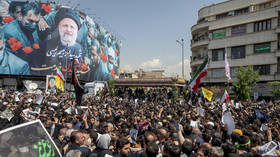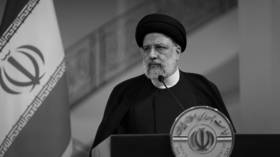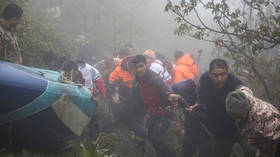Fyodor Lukyanov: Will the death of its president lead to a different Iran?

The tragic deaths of Iran’s President Ebrahim Raisi and Foreign Minister Hossein Amir-Abdollahian have re-awakened fatalistic thoughts about the twists and turns of fate. There is the inevitable suspicion that someone “helped” the helicopter fall. The truth will be discovered eventually, but for now we can only recall that 14 years ago the crash of Polish President Lech Kaczynski’s plane near Smolensk seemed so improbable that it was impossible to believe it was a mere coincidence of circumstances. Everything turned out to be simpler and more mundane, although paranoid associates of Kaczynski still insist it was a terrorist attack. But this is a clinical question.
Iran is a key country in West Asia. Almost all of the most important processes in that part of the world are connected to Tehran in one way or another – either it’s directly involved or it influences them. The stability of the Iranian state is one of the most important factors in the regional balance; some like it, some don’t, but everyone recognizes it. So the first question is whether the upheaval could lead to internal instability that will spill over. Iranian experts will make well-founded arguments, but to an outside observer, such as the author of these lines, the system seems quite resistant to such events. In the Iranian system of government, the president is not the head of state (he is a spiritual leader) but the head of the executive, something like a prime minister, not of a technocratic but of a political nature.
The president is elected by popular vote, but this is preceded by a stage of ideological screening and elimination of candidates who are unacceptable to the political guardians. In this way, electoral pluralism is respected, but diversity is limited by the approved framework. This fulfils the task of avoiding sharp turns. It’s important to note that presidential (as well as parliamentary) elections are not a process of approving selected candidates, that there is real competition and struggle, and the outcome is not always the way the supreme clerical power prefers. Thus, both President Khatami in the 1990s and President Ahmadinejad in the 2000s, ideological opposites, were elected against the expectations of the ruling group.
However, it did not lead to shocks because the extremes had already been cut out. And now in Iran, as in most countries of the world these days, the ability to achieve the desired result without blatant electoral distortions, is improving.
Nevertheless, Iran’s political landscape is heterogeneous, as in any large and influential country. Thanks to a complex system of management and control and a certain duplication of functions, the state apparatus is quite resistant to shocks such as the one that has just occurred. There is no power vacuum. However, the same complexity and the presence of groups with different (sometimes very different) interests increase the risks of disturbing the internal balance. Especially as the internal situation in Iran is, to put it mildly, far from ideal. The fatigue of part of the active population with theocratic rule and its restrictions, on the one hand, the negative impact of US sanctions on development, on the other, and the general increase in anxiety as the region becomes a center of international upheaval, all create potential conditions for the situation to unravel. And in this sense, any unforeseen development carries risks. The extent to which anyone wants to exploit them will become clear in the near future.
Relations between Iran and Israel, the two main regional rivals, have become not only the core of Middle East politics but also a factor of global significance. The confrontation is irreconcilable and there is no way out, even hypothetically. It is natural that these two countries appear in the nuclear context – Israel as a de facto possessor of weapons and Iran as a power that is capable of producing them. This underlines the status of these two actors, which is different even from such weighty states as Turkey or Saudi Arabia. Despite the sharp talk, Iran and Israel have treaded carefully. As the recent exchange of blows has shown, neither wants to take it further, at least not yet. But within the “red lines” understood by the parties, rivalry is fierce. And mutual encouragement of internal instability is the norm. The situation between Iran and the US is similar, although here the parties’ capacity to compromise is somewhat greater. This was demonstrated in the last decade during negotiations about Iran's nuclear program, but then everything collapsed.
For the Iranian leadership, the most important thing now is to convince its own people and outside observers that the stability of the system is intact and that it’s functioning normally. No changes in foreign policy should be expected, as the rudder is in the hands of the spiritual leader, Ali Khamenei. Situational adjustments are possible. For Russia, the death of Raisi is a particularly sad event, because the president was sympathetic to our country and was determined to work closely with us. But no Iranian leader will allow a break with Moscow. It is also true that the interests of Iran and Russia do not coincide in all areas, and any top man in Tehran will defend his own positions firmly.















